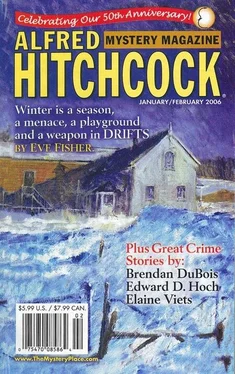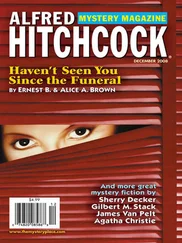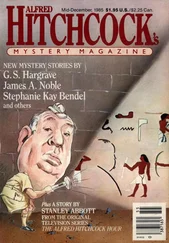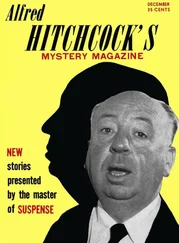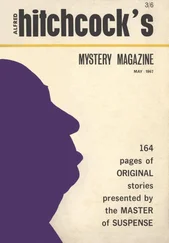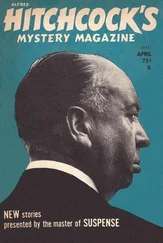John Betancourt - Alfred Hitchcock’s Mystery Magazine. Vol. 51, No. 1 & 2, January/February 2006
Здесь есть возможность читать онлайн «John Betancourt - Alfred Hitchcock’s Mystery Magazine. Vol. 51, No. 1 & 2, January/February 2006» весь текст электронной книги совершенно бесплатно (целиком полную версию без сокращений). В некоторых случаях можно слушать аудио, скачать через торрент в формате fb2 и присутствует краткое содержание. Город: New York, Год выпуска: 2006, Издательство: Dell Magazines/Crosstown Publications, Жанр: Детектив, на английском языке. Описание произведения, (предисловие) а так же отзывы посетителей доступны на портале библиотеки ЛибКат.
- Название:Alfred Hitchcock’s Mystery Magazine. Vol. 51, No. 1 & 2, January/February 2006
- Автор:
- Издательство:Dell Magazines/Crosstown Publications
- Жанр:
- Год:2006
- Город:New York
- ISBN:нет данных
- Рейтинг книги:4 / 5. Голосов: 1
-
Избранное:Добавить в избранное
- Отзывы:
-
Ваша оценка:
- 80
- 1
- 2
- 3
- 4
- 5
Alfred Hitchcock’s Mystery Magazine. Vol. 51, No. 1 & 2, January/February 2006: краткое содержание, описание и аннотация
Предлагаем к чтению аннотацию, описание, краткое содержание или предисловие (зависит от того, что написал сам автор книги «Alfred Hitchcock’s Mystery Magazine. Vol. 51, No. 1 & 2, January/February 2006»). Если вы не нашли необходимую информацию о книге — напишите в комментариях, мы постараемся отыскать её.
Alfred Hitchcock’s Mystery Magazine. Vol. 51, No. 1 & 2, January/February 2006 — читать онлайн бесплатно полную книгу (весь текст) целиком
Ниже представлен текст книги, разбитый по страницам. Система сохранения места последней прочитанной страницы, позволяет с удобством читать онлайн бесплатно книгу «Alfred Hitchcock’s Mystery Magazine. Vol. 51, No. 1 & 2, January/February 2006», без необходимости каждый раз заново искать на чём Вы остановились. Поставьте закладку, и сможете в любой момент перейти на страницу, на которой закончили чтение.
Интервал:
Закладка:
Casteven shook his head and looked at the floor, which needed a good scrubbing. “It’s pretty scary, you know? Your neighbor getting blown away right across the street.
“We had some pretty rough stuff going on when we lived in the Drysdale District, but that was just break-ins — kids with crowbars. Did they ever catch those guys that held up the grocery here last winter? Highmore swore it was the same guys both times.”
“That case is still open,” said Auburn, winging it. “Have you ever had any trouble like that here?”
“Not yet.” Casteven rapped on the bar for luck.
“Do you own the building?”
“Oh no. Lease.”
“Your business seems to be good.”
“Don’t you believe it. My business is rotten. I can’t compete with the fast food places across the river, or the bars over there that cater to the neurosurgeons and the stockbrokers from downtown.” He finished his drink and filed away the empty can under the bar. After a glance toward the dining room, he assumed a more confidential air. “When my wife died, I lost my bartender and cashier. And I have to pay Darla a lot more than she’d get downtown because the old soaks and deadbeats that hang out in this place would rather blow their Social Security checks on booze and cigarettes and lottery tickets than leave tips.”
“I’ll keep that in mind,” said Auburn. “Is it just the two of you all the time here?”
“My brother-in-law Greg takes over the bar a little after three, when he gets off his other job, and he stays till eleven. We shut down the kitchen at eight, and that’s when Darla and I knock off. We’re closed Sundays.”
Darla sang out, “One country up and a side of Murphy, no dash.” Casteven cinched his apron tighter around his ample middle and went back to the grill.
In spite of the proprietor’s grim report, the place seemed to be filling up for the lunch hour. A group of six East Indians dressed as workmen came in together and took adjoining tables. An elderly man, his features blurred by age like the face on a well-worn coin, sat down at the table next to Auburn’s. Obviously a regular, he put on a pair of reading glasses and studied a morning paper he’d brought with him instead of the menu. His hands were bony and gnarled like those of a retired plumber, the nail of the left thumb permanently cloven.
Darla appeared at Auburn’s side. “You working up an appetite for lunch? Our special on Thursdays is Cajun-style chicken giblets and rice.”
Auburn already knew that from the slate over the lunch counter. At the very mention of the word “Cajun,” his stomach performed the preliminary steps of a war dance. He chose Salisbury steak, which, although sometimes scarcely worth the effort of chewing, is hard for even a novice chef to ruin.
Time passed. Auburn was so absorbed in his watch on the empty house across the street and his attention to the pulse of life around him that he didn’t even realize that he’d gone through his soup, salad, and main course until Darla swept away his empty plates. “How we doing here? How about some dessert? The peach cobbler’s fresh today.”
“Just some more coffee, thanks.” Glancing yet again across the street, he saw a pickup truck pulling into Ida Blanford’s driveway and canceled the order. He paid his check at the cash register and left all his change from a ten and a five on the table, partly because of what Casteven had said about tips and partly because he expected to spend more time later at The Green Fish.
By the time Auburn got across the street, the driver of the truck, a lanky man in his late thirties, had mounted the bank and was staring down at the spot where Ida Blanford’s body had been found.
“Mr. Blanford?” Auburn showed identification.
“Yes, sir.” Wearing a housepainter’s cap with the visor turned backwards, sunglasses with small round lenses, and time-tattered camouflage fatigues, Blanford looked like an alien in a low-budget sci-fi flick made in the 1960’s. Underneath these trimmings he had a crew cut and a square, matter-of-fact face.
“We talked on the phone earlier.”
“I was going to call you from the house.”
“Have you been downtown to the mortuary?”
“Oh, yes.” Blanford shook his head as if to dispel the grim recollection. “That’s where they found her, huh? I can remember standing down there throwing rocks in the river when I was about a year and a half old, and Aunt Ida yelling at me to get out of the mud.” He stared unseeingly out over the water through the midday haze.
“Do you know if she’d had any kind of trouble lately with neighbors, vandals...?”
“If she did, she didn’t tell me about it. What I can’t understand is what she was doing outside here after dark.”
“She may not have been outside when she was killed. Would she have been likely to let anybody in the house that she didn’t know?”
“Not unless they forced their way in. Caution was her middle name.” He turned to face the house. “Look at those lightning rods. And I’m sure you saw the smoke alarms and carbon monoxide detectors all over the inside.”
He took out a ring of keys, the same bunch Auburn had found in the dead woman’s purse, which Stamaty had evidently handed over to him. “I better check inside and make sure everything’s okay. She kept a lot of money upstairs. Whoever shot her could have made a real haul if they used these keys instead of just cleaning the cash out of her purse.”
They climbed down from the levee to the sidewalk. “This was prime real estate when my grandfather built the house in the twenties,” Blanford said. “And there wasn’t any saloon across the street back then, either.”
“Did your aunt ever have any trouble with the people over at The Green Fish?”
“I wouldn’t say trouble. Mostly she acted like the place wasn’t even there. She used to complain about the noise around closing time, especially on Saturday nights. And the lines waiting for green beer at six o’clock in the morning on St. Patrick’s Day.”
They went through the gate with the squeaky hinges and up the walk. “When was the last time you saw your aunt alive?”
“We had dinner here a week ago Sunday — my wife and I and our two kids.”
“You said you and your sister are the only living relatives?”
“Yes, sir.”
“So you’re probably the only heirs?”
“I guess so.” The thought didn’t seem to distress him unduly.
Once inside the house, Blanford took off his cap and slid his sunglasses up to the top of his head. He cast a wary and perhaps now a proprietorial eye here and there as they moved through the immaculately kept rooms. At the foot of the front stairs he got out the keys again. “I haven’t been allowed upstairs since I was about six,” he said, “but I remember exactly where she kept her money.”
He led Auburn to Ida Blanford’s bedroom and on into a windowless alcove fitted out as a dressing room. Here, concealed by a wall hanging, was a squat antique safe with the manufacturer’s name splashed across the front in fancy script. Without hesitation, Blanford selected a key and opened the safe. Except for a few papers, which didn’t include a will, the safe was empty.
“There ought to be a lot of cash here,” he said, moderately agitated. “She inherited a couple million from my grandfather — he owned a brass foundry, Kingmark Castings. And she used to lend money to people starting up in business — young doctors, lawyers... she even staked me when I started up my construction business.”
“Seems like a tough racket for an elderly lady to be in.”
“You didn’t know my aunt Ida. She could stir her tea with one hand and whip a tiger with the other. You get like that after teaching seventh and eighth grades in an inner-city school for about forty years. She’d still be at it if her eyes hadn’t gone out on her. Glaucoma and a bunch of other stuff.”
Читать дальшеИнтервал:
Закладка:
Похожие книги на «Alfred Hitchcock’s Mystery Magazine. Vol. 51, No. 1 & 2, January/February 2006»
Представляем Вашему вниманию похожие книги на «Alfred Hitchcock’s Mystery Magazine. Vol. 51, No. 1 & 2, January/February 2006» списком для выбора. Мы отобрали схожую по названию и смыслу литературу в надежде предоставить читателям больше вариантов отыскать новые, интересные, ещё непрочитанные произведения.
Обсуждение, отзывы о книге «Alfred Hitchcock’s Mystery Magazine. Vol. 51, No. 1 & 2, January/February 2006» и просто собственные мнения читателей. Оставьте ваши комментарии, напишите, что Вы думаете о произведении, его смысле или главных героях. Укажите что конкретно понравилось, а что нет, и почему Вы так считаете.
